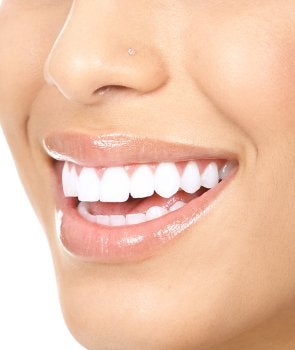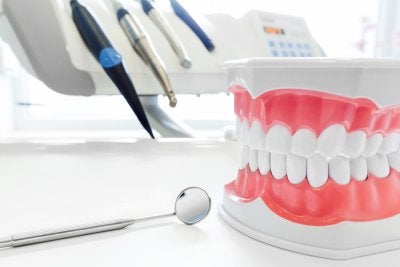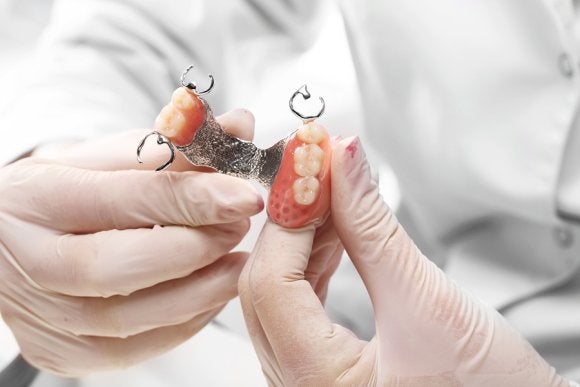-
The Latest Ways to Improve Your Smile
Modern cosmetic dentistry in Bel Air, MD , offers many solutions to help patients achieve the smiles of their dreams. A dentist who practices cosmetic dentistry focuses on improving the appearance of a patient’s mouth, teeth, and smile. These treatments are generally considered elective and are customized depending on an individual’s preferences, needs, and goals. Continue reading to learn more about new cosmetic dentistry trends, including teeth whitening, porcelain veneers, and dental implants.

Teeth Whitening
Teeth whitening is the most common procedure in cosmetic dentistry today. When performed by dentists in a dental clinic, teeth whitening can brighten the teeth several shades in under an hour. While professional teeth whitening procedures vary, a dentist generally applies a bleaching gel to your teeth first. Next, your dentist will use a light to activate the solution. You can listen to music or watch TV during two 20-minute treatments, and the entire procedure is completely painless.Porcelain Veneers
If you have especially dark stains on your teeth, have a chipped tooth, or have different sized or shaped teeth, your dentist may recommend porcelain veneers. Porcelain veneers like Lumineers are comprised of thin sheaths of tooth-colored material. Veneers completely cover the fronts of teeth, concealing any discolorations or imperfections. Dentists also suggest using veneers as an alternative to braces. Lumineers can also correct misaligned, overlapping, or gapped teeth—without the long treatment time associated with braces.Dental Implants
Are you missing one or more teeth? Dental implants are permanent solutions to missing teeth. Dental implants consist of tiny titanium screws that are surgically implanted into the jaw by a dentist. The implants are then covered with dental bridges or crowns. Unlike dentures, which can be uncomfortable and make it difficult to eat and speak with confidence, dental implants function and look like your natural teeth. Additionally, dental implants encourage bone growth. For patients whose jaw bones have begun to deteriorate due to tooth loss, dental implants are the best choice. -
How BriteSmile Works
When you visit your dentist in Bel Air, MD for BriteSmile treatment, you can expect the very latest in teeth whitening technology. BriteSmile is an efficient, affordable, and painless procedure.
BriteSmile teeth whitening is known specifically for its effectiveness and gentleness. This teeth whitening procedure is performed by dentists in dental clinics. BriteSmile is recommended for patients of all ages, excluding children. When you visit your dentist for a BriteSmile treatment, you can expect to dramatically improve the appearance of dull, discolored, yellow, or darkened teeth. After just a single one-hour visit, you will have a brighter, whiter smile. BriteSmile teeth whitening uses a combination of special bleaching gel and a cool, blue light to whiten your teeth. First, your dentist will apply the BriteSmile gel to your teeth. Next, your dentist will apply the BriteSmile light for 20 minutes. You can sit, relax, and watch TV or listen to music the entire time. After one or two more 20-minute applications, you will have noticeably whiter teeth. Before you leave the dental office, your dentist may advise you to avoid certain foods and beverages for a short time to avoid staining your teeth.

-
Choosing Between Dental Implants and Dentures
Are you deciding between dentures and dental implants near Bel Air, MD ? You are not alone. Dentists report that almost 70% of American adults between 35 and 44 have at least one missing tooth, and the numbers only increase with age. Fortunately, cosmetic dentistry now offers many different options for restoring your smile, including dental implants and dentures. Continue reading to learn more.
Bone Health
The first step in deciding between dental implants and dentures involves asking your dentist to evaluate your jaw bone. When you schedule a consultation with your dental clinic, your dentist will determine whether you have enough healthy bone to support dental implants. When you lose teeth, the bone beneath naturally deteriorates, because it has no tooth to support. However, for dental implants to successfully adhere to the jaw, there must be sufficient healthy bone to support them.
bone to support dental implants. When you lose teeth, the bone beneath naturally deteriorates, because it has no tooth to support. However, for dental implants to successfully adhere to the jaw, there must be sufficient healthy bone to support them. Permanent Solution
Dental implants are ideal for individuals who want a permanent solution to missing teeth. Because they fuse directly with the jawbone, dental implants last a lifetime. Additionally, the bridge or dental crowns function just like normal teeth. However, some patients prefer the efficiency and ease of dentures. Dentures do not require surgery and can often be created in a single day, so you can leave your dentist with a full set of teeth. Additionally, dentures can be easily removed and require little at-home care.Cosmetic Appearance
When you decide between dentures and dental implants, you may also want to consider how much importance you place on your smile’s cosmetic appearance. Both dentures and dental implants are much more natural looking today than ever before. However, dental implants and crowns offer an aesthetic advantage over dentures, because they look just like natural teeth. If having a full set of beautiful teeth is important to you, be sure to consider dental implants. -
Treating an Abscessed Tooth
If you have an abscessed tooth, it means that the bulb of your tooth is infected. A pocket of puss forms under the tooth and is usually quite painful. The infection is caused by advanced gum disease in Bel Air or tooth decay and the infected portion of the abscessed tooth will need to be removed. To treat an abscessed tooth, a dentist in Bel Air will perform a root canal .
Watch this video to learn more about treating an abscessed tooth and what causes the infection to happen. In addition to tooth decay, a cracked tooth can also cause an abscessed tooth. A root canal is when a dentist removes the infected portion of the tooth and seals the tooth with a crown.
-
Steps to Take in Preventing Gum Disease
Gum disease, also known as periodontal disease, is one of the leading causes of tooth loss in adults. Initially, periodontal disease in Bel Air can be difficult to detect until it has advanced. In the early stages of gum disease , usually referred to as gingivitis, most people may not notice any signs at all. This is why it is so important to regularly visit a dentist to monitor signs of gum disease. Luckily, gum disease is easy to prevent. Since it is caused by bacteria, it is simply a
 matter of reducing the amount of bacteria in your mouth. Keep reading for tips on gum disease prevention.
matter of reducing the amount of bacteria in your mouth. Keep reading for tips on gum disease prevention. Routinely Brush and Floss
A dental hygiene routine is key to preventing gum disease. At a minimum, you should brush your teeth twice a day and floss teeth once a day. For the best results, brush and floss after each meal. This will help eliminate food particles that can get stuck in between teeth and cause bacteria to grow. It is important to use a toothbrush with different lengths of bristles to ensure that all surface area of each tooth is reached. Using toothpaste with fluoride helps protect your mouth from gum disease. When flossing, be sure to get in between each tooth, especially the back molars. In addition to brushing and flossing, a mouthwash can help rinse away pieces of food and also freshen your breath.Regularly Visit the Dentist
No oral health care routine is complete without annual visits to the dentist. Most dentists recommend regular visits every six months. During a dental exam, a dental hygienist will perform a teeth cleaning that is able to remove plaque and tartar that you cannot clean off at home. Once plaque hardens, it forms tartar, which can lead to gum disease. Regular dental cleanings help prevent tartar buildup. A dentist will likely take x-rays to detect any abnormalities in your mouth. By regularly visiting your dentist, you can also notify them of any new pain or other problems. Early detection of problems can prevent major problems down the road and also help you avoid the need to see an emergency dentist. -
The Purpose of a Fixed Bridge
A dental bridge is just what it sounds like, as it bridges the gap between two teeth. If you are missing a tooth, dentists in Bel Air will likely recommend a fixed bridge. The bridge itself is composed of a prosthetic tooth that rests in the gap and is attached to two crowns that sit on top of the adjoining teeth. In many cases, the surrounding teeth are modified so that the dental crown will securely fit on top of the existing tooth. Dentists may recommend a bridge over a dental implant since it is a quicker form of treatment to replace a missing tooth.
The purpose of the fixed bridge is to prevent any issues with your remaining teeth and gums following the loss of a tooth. When a tooth is missing, teeth can drift towards the gap. This can create alignment issues. Additionally, when a tooth is missing, the bone can begin to deteriorate where the tooth once was. A dentist can place a bridge to help keep your bone and jaw structure in tact.

-
Reasons to Choose Invisalign
Teenagers and adults have many options for getting a straighter smile. While braces in Bel Air are a common choice, more and more patients are asking their dentists about Invisalign. Invisalign offers a number of benefits that traditional braces cannot match. This article will highlight just some of the reasons you should pick Invisalign to achieve your

perfect smile.
The Aligner Trays Can Be Removed
Unlike traditional braces, which do not come off for the entire duration of treatment, Invisalign aligner trays do not need to be worn 24 hours each day. Since you can remove the trays at mealtimes, it means that Invisalign has no food restrictions. You do not have to make any modifications to your diet or worry about food getting stuck in between wires and brackets. Instead, trays can simply be removed and put back once mealtime is over. This also means that your dental hygiene routine of brushing and flossing can continue normally throughout your orthodontic treatment, leaving you less susceptible to gum disease.They Are Virtually Invisible
Many adults are hesitant to seek orthodontic treatment for crooked teeth, as they are worried about their appearance. Since Invisalign aligner trays are made from a clear plastic, and are custom made to fit directly over your teeth, they are virtually invisible. In fact, most people will not even know you are wearing Invisalign—unless you tell them.It is Effective
Invisalign works by utilizing a series of custom made aligner trays. These trays are made to match the treatment plan predetermined by your orthodontist to map out all movement of your teeth. The trays are swapped out every couple of weeks, meaning you can see the changes to the alignment of your teeth throughout treatment. In most cases, treatment with Invisalign accomplishes desired results in less time than traditional braces.It is More Comfortable
One of the biggest complaints about traditional braces is that they can be uncomfortable, and at times even painful. Invisalign is comfortable to wear, and most of the time, you won’t even notice the aligner trays are there! -
What Is Your Sensitivity Saying About Your Teeth? [INFOGRAPHIC]
Do hot, cold, and sweet foods send an unwelcome jolt through your mouth? If so, you could be suffering from sensitive teeth. Tooth sensitivity occurs when the gums retract, exposing the dentin, which provides a straight path to the nerves in your teeth. Extreme temperatures and high-sugar foods trigger those nerves and cause a searing, painful sensation. Tooth sensitivity isn’t a dental health problem in itself but is rather a symptom that should be evaluated by your dentist if it persists. While some cases of sensitivity are easily addressed by changing toothbrushes, other cases are associated with decay and disease that should be treated by your dentist. Learn more about tooth sensitivity in this infographic from Your Smile . Our dentist in Bel Air, MD provides comprehensive oral health care, including dental implants, cosmetic dentistry, and tooth extraction. Contact us to set up an appointment, and please share this information with your friends and family.

-
Oral Health During Pregnancy
If you are pregnant or plan on becoming pregnant soon, you can expect many changes in your life. In addition to making room in your home for your new family member, you’ll be making many appointments to make sure your health is in good order. This includes calling your dentist in Bel Air, as pregnancy can cause changes in your oral health. Watch this video to learn more about how your dentist can help you maintain good oral health during pregnancy .
As your dentist can tell you, pregnant women may notice that their gums are more sensitive or bleed more easily during the first few months of pregnancy. This is known as pregnancy gingivitis, and is a relatively common occurrence. You should brush your teeth twice per day and floss every day, taking care to use a fluoride toothpaste and a toothbrush with soft bristles, to prevent gingivitis and gum disease. Your diet is important during pregnancy both for you and your growing baby. Go for a variety of fruits, vegetables, and dairy products, and try to minimize your sugar intake to keep your mouth and body healthy.
-
Risk Factors for Gum Disease
Everyone wants to have a beautiful smile full of healthy, white teeth. However, there’s more to oral health than just having a bright smile. In addition to visiting your dentist near Bel Air every six months, you should brush your teeth twice per day and floss on a daily basis. This combination of professional and at-home oral care will help keep tooth decay and gum disease at bay. Gum disease can be painful and damaging to your oral health, as it could lead to tooth loss if it is left to progress unchecked. Keep reading to learn about the risk factors for gum disease and what you can do lower your risk.
Age
While there are some risk factors for gum disease that you and your dentist can control, there are others that you just can’t. As you grow older, you are at a greater risk for gum disease. According to the Centers for Disease Control and Prevention, over 75 percent of people in the U.S. ages 65 and older have gum disease. Make sure that you are visiting your periodontist regularly if you have a history of or signs of gum disease.
visiting your periodontist regularly if you have a history of or signs of gum disease. Smoking
It is widely known that smoking and using other forms of tobacco is dangerous for your health, and your oral health is no exception. Smoking greatly increases your risk of periodontal disease, and using tobacco can exacerbate any gum disease that is already present. Additionally, if you continue to smoke, it will be much more difficult to treat gum disease in a successful manner.Genetics
If you have a family history of gum disease, you may be at a greater risk of developing it yourself. That’s why it’s important to discuss your medical history with your dentist, as a preventive treatment plan can help lower your risk of gum disease.Stress
Stress can take a physical toll on your body as well as mental and emotional tolls. Studies have shown that high levels of stress make it harder for your body to fight off infections, which can include periodontal disease. Work on reducing your stress levels to improve your oral health as well as your overall outlook.
RECENT POSTS
categories
- Uncategorized
- General Dentistry
- Toothache
- Emergency Dentistry
- Family Dentistry
- Receding Gums
- Cosmetic Dentistry
- Veneers
- Gum Disease
- Gingivitis
- Dental Crowns
- Orthodontics
- Dental Implants
- Root Canal
- Wisdom Teeth
- Teeth Whitening
- Your Smile
- Composite Fillings
- Lumineers
- Dentures
- Invisalign
- BrightSmile
- Dental Bridge
- Abscessed Tooth
- Sealants
